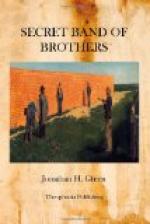The unfortunate prisoner discovered, when it was too late, that his supposed honest brotherhood were not what their profession had led him to believe. Poor fellow! he had not taken enough degrees to learn the full “mystery of iniquity.” Every effort was made to procure a light bail, but it could not be effected. At last an arrangement was made, and for a stipulated sum he was placed in charge of a committee, who had him removed to the hospital. The colonel, by this time, was, to appearance, very dangerously ill. He was removed to his new quarters, but not permitted to regain his health, lest the spell of their deceit should be broken. His visitors were numerous. To his face, they appeared his most sincere friends. They seemed deeply interested in his welfare, and made bountiful proffers of sympathy and assistance. His true friends, who were capable of rendering him succour, were very few. He had many of the lower class of the brotherhood, the novitiates, who were ready to act energetically and in good faith. But the head men—the very individuals who had reaped the spoils of his doings—were his worst enemies. They had received the lion’s share, without leaving the poor jackall even the scraps, but turned him over, unaided, to the tender mercies of a felon’s fate. They had filled their pockets with the richest of the spoils, and would not now contribute a penny to reward their benefactor.
At this time, there were one hundred of the brotherhood in the city, who might have procured bail; but gratitude found no place in their hearts. They had also violated their oaths. Day after day would parties of his old friends and neighbours visit him, both in the prison and hospital. They would tell him that arrangements were in progress to effect his escape. The whole, however, was false, as no action had been taken. The prisoner depended much upon a delegation from Dearborn county, Indiana, of whom he had a right to claim assistance; but they, like the rest, proved traitors. I have counted thirty different men from that county, who visited him from time to time. These, at home, were men of good standing, equally respected with other citizens. Several were leading men in all the moral and religious enterprises of the day, and generally individuals of wealth. Two of them, I knew, made great professions of religious enjoyment and zeal. One was a very strict church-going man, but with the heart of a Judas. His hypocrisy was of such a deep and damning character, I can hardly forbear giving his name. Duty might demand his exposure, but for the injury that would be inflicted upon an innocent family. These men may reform. I am delaying exposure. I hope ere long to have an evidence of their sincere repentance, but fear they are too far gone, too much in love with the wages of iniquity. They have too long turned a deaf ear to the pitiful cries of the widow and orphan whose ruin they have effected, whose natural protector they




